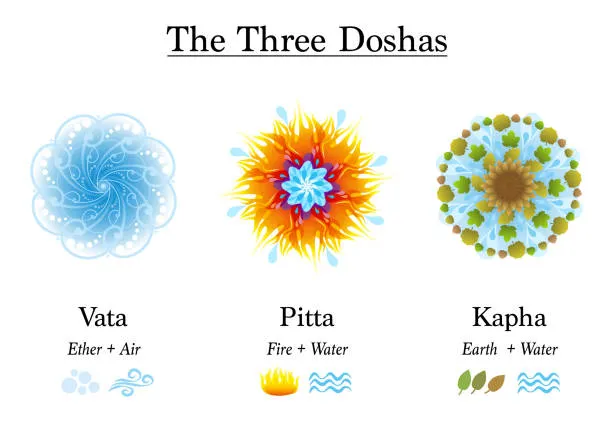
How Vata, Pitta, and Kapha Influence Your Mind, Body, and Energy ?
June 13, 2025
Ayurveda, the timeless Indian system of holistic health, holds the wisdom of understanding ourselves as integral parts of nature. At the heart of this 5,000-year-old practice lies the concept of Doshas—Vata, Pitta, and Kapha. These three energies shape everything about us, from our physical health to our mental state and even the way we interact with the world around us.
Understanding Doshas provides a personalized approach to wellness, offering insights into how to align your lifestyle with your natural constitution. Whether you're experiencing stress, digestive issues, or fatigue, Ayurveda believes the root cause lies in Dosha imbalances. This guide will help decode how Vata, Pitta, and Kapha influence your mind, body, and energy and what you can do to keep them in balance.
What Are the Doshas?
At its core, Ayurveda recognizes five universal elements: Earth, Water, Fire, Air, and Ether (Space). These elements combine to form the three Doshas. While each individual possesses all three, their proportions are unique, forming a "Prakriti" (natural constitution). Here's a quick breakdown:
- Vata (Air + Ether) – Governs movement and creativity.
- Pitta (Fire + Water) – Governs transformation and metabolism.
- Kapha (Earth + Water) – Governs stability and structure.
1. Vata: The Energy of Movement
Mind
Vata types tend to be creative, quick-thinking, and imaginative. They're often full of ideas, but their mental energy can feel scattered, making it hard to focus for extended periods.
Body
Physically, Vata individuals usually have a light frame and dry skin. They may deal with irregular digestion.
Energy
Vata governs energy movement in the body. When balanced, they exhibit bursts of enthusiasm and vitality. However, they're also prone to energy crashes, feeling overwhelmed, or anxious during periods of imbalance.
When Vata is Imbalanced
- Symptoms include insomnia, fear, constipation, and racing thoughts.
- External factors like cold weather, travel, and irregular routines can aggravate Vata.
2. Pitta: The Energy of Transformation
Mind
Pitta individuals are intelligent, ambitious, and highly focused. They enjoy challenges and excel at problem-solving.
Body
They typically have a medium build with warm body temperatures and strong digestion.
Energy
Pitta drives leadership and competitiveness, with a high level of assertiveness. They thrive in structured, goal-oriented environments.
When Vata is Imbalanced
- Look out for irritability, impatience, inflammation, heartburn, or an overcritical nature.
- Triggers such as hot climates, stress, and spicy foods often increase Pitta imbalances.
3. Kapha: The Energy of Stability
Mind
Kapha types are calm, nurturing, and loyal. They naturally exude patience and prefer deep, meaningful connections over surface-level interactions.
Body
They tend to have solid, strong builds and smooth skin, but their metabolism and digestion may be slower than other Dosha types.
Energy
Kapha energy is consistent and grounded, which gives them stamina. However, they can easily tip into sluggishness or lethargy if not properly stimulated.
When Vata is Imbalanced
- Symptoms include weight gain, depression, excessive attachment, and lack of motivation.
- Cold, damp weather, inactivity, and overeating can worsen Kapha imbalances.
How to Identify Your Dominant Dosha
Basic Self-Assessment
Begin identifying your Dosha by reflecting on patterns in your physical features, emotional tendencies, digestion, and energy levels. For example:
- Vata types will notice a love for creativity but struggle with focus.
- Pitta types may feel driven yet frequently deal with impatience.
- Kapha types will recognize their nurturing qualities along with occasional sluggishness.
Balancing the Doshas for Optimal Health
General Tips Based on Dosha
Balancing the Doshas is key to maintaining physical and mental health. Each requires its approach to diet, lifestyle, and mindfulness practices.
1. Vata Balance
- Diet: Favor warm, moist, and nourishing foods like soups and stews. Avoid cold, raw, or dry foods.
- Lifestyle: Stick to a regular routine with consistent sleeping and waking times.
- Mindfulness: Practice grounding exercises like yoga or meditation to reduce anxiety.
2. Pitta Balance
- Diet: Focus on cooling, hydrating foods such as fresh fruits, cucumber, and coconut water. Minimize spicy or acidic foods.
- Lifestyle: Spend time in nature, avoid overworking, and engage in calming activities.
- Mindfulness: Avoid criticism, and practice gratitude journaling to cultivate calmness.
3. Kapha Balance
- Diet: Go for light, warm, and spicy foods like ginger tea or sautéed greens. Limit heavy or oily foods.
- Lifestyle: Incorporate high-energy workouts like running or cycling to stay active.
- Mindfulness: Break out of your comfort zone by trying new experiences and settings.
Find Your Balance and Thrive
Ayurveda teaches us that balance is the foundation of health and happiness. Whether you're a fiery Pitta, a creative Vata, or a grounded Kapha, understanding your Dosha can transform the way you approach wellness. By making simple shifts in your diet, routine, and mindset, you can experience harmony in your mind, body, and energy.
Are you curious about your Dosha but unsure where to begin? Exploring the teachings of Ayurveda can feel overwhelming, but it doesn't have to be. Engage with an Ayurvedic practitioner or start incorporating small daily practices suited to your constitution. Your Ayurvedic wellness journey starts with self-awareness. Begin today and uncover a healthier, more harmonious you.



